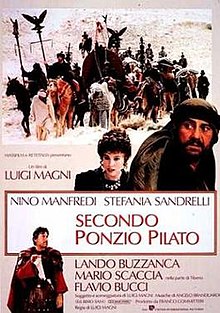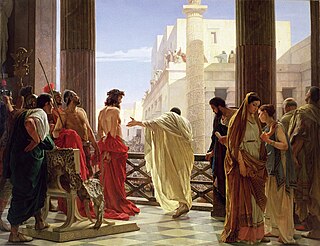
Pontius Pilate was the fifth governor of the Roman province of Judaea, serving under Emperor Tiberius from 26/27 to 36/37 AD. He is best known for being the official who presided over the trial of Jesus and ultimately ordered his crucifixion. Pilate's importance in Christianity is underscored by his prominent place in both the Apostles' and Nicene Creeds. Because the gospels portray Pilate as reluctant to execute Jesus, the Ethiopian Orthodox Tewahedo Church believes that Pilate became a Christian and venerates him as both a martyr and a saint, a belief which is historically shared by the Coptic Church, with a feast day on 19 or 25 June, respectively.

Herod Antipas was a 1st-century ruler of Galilee and Perea. He bore the title of tetrarch and is referred to as both "Herod the Tetrarch" and "King Herod" in the New Testament. He was a son of Herod the Great and a grandson of Antipater the Idumaean. He is widely known today for accounts in the New Testament of his role in events that led to the executions of John the Baptist and Jesus of Nazareth. His father, Herod the Great, was described in the account as ordering the Massacre of the Innocents, marking the earliest Biblical account of the concerns of the government in Jerusalem regarding Jesus' existence.
Hristo Naumov Shopov is a Bulgarian actor. Shopov's father, Naum Shopov, was a famous Bulgarian actor as well.
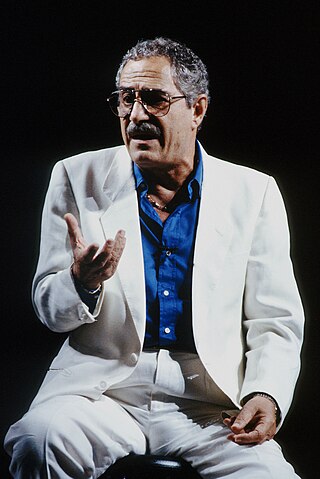
Saturnino "Nino" Manfredi was an Italian actor, voice actor, director, screenwriter, playwright, comedian, singer, author, radio personality and television presenter.
The unnamed wife of Pontius Pilate appears only once in the Gospel of Matthew (27:19), where she intercedes with Pilate on Jesus' behalf. It is uncertain whether Pilate was actually married, although it is likely. In later tradition, she becomes known as Procula, Procla or Procle and plays a role in various New Testament Apocrypha. At a later date, she acquires the name Claudia Procula in Western tradition, as well as other names and variants of these names. She is venerated as a saint by the Eastern Orthodox Church, the Eastern Catholic Church, the Coptic Church, and the Ethiopian Church. She has also frequently been featured in literature and film.

Barabbas is a 1961 religious epic film directed by Richard Fleischer for Dino De Laurentiis Cinematografica, expanding on the life of Barabbas, from the Christian Passion narrative in the Gospel of Mark and other gospels. It stars Anthony Quinn, Silvana Mangano, Katy Jurado, Arthur Kennedy, Harry Andrews, Ernest Borgnine, Vittorio Gassman, and Jack Palance. The screenplay is based on Nobel Prize-winner Pär Lagerkvist's 1950 novel of the same title.
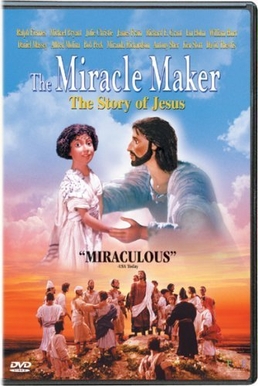
The Miracle Maker sometimes subtitled The Story of Jesus, is a 1999 Welsh-Russian stop motion-animated film directed by Derek Hayes and Stanislav Sokolov.
Matthew 28:14 is the fourteenth verse of the twenty-eighth chapter of the Gospel of Matthew in the New Testament. This verse is part of the resurrection narrative. In this verse the priests of Jerusalem assured the safety of the tomb guards should the governor, Pontius Pilate, receive report of their failure.

The Pilate stone is a damaged block of carved limestone with a partially intact inscription attributed to Pontius Pilate, a prefect of the Roman province of Judaea from AD 26 to 36. It was discovered at the archaeological site of Caesarea Maritima in 1961.

The Last Temptation of Christ is a 1988 epic religious drama film directed by Martin Scorsese. Written by Paul Schrader with uncredited rewrites from Scorsese and Jay Cocks, it is an adaptation of Nikos Kazantzakis' controversial 1955 novel of the same name. The film, starring Willem Dafoe, Harvey Keitel, Barbara Hershey, Andre Gregory, Harry Dean Stanton and David Bowie, was shot entirely in Morocco.

Luigi Magni was an Italian screenwriter and film director.
Deicide is the killing of a god. The concept may be used for any act of killing a god, including a life-death-rebirth deity who is killed and then resurrected.
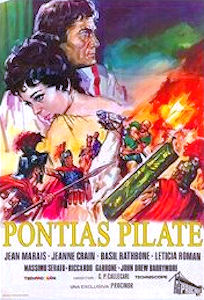
Pontius Pilate is an Italian drama film from 1962, directed by Gian Paolo Callegari and Irving Rapper, written by Oreste Biancoli, starring Jean Marais and Jeanne Crain.

The Day Christ Died is a 1980 American television film directed by James Cellan Jones, and produced by 20th Century Fox and CBS-TV. A dramatization of the last 24 hours of Jesus Christ's life, it is based on Jim Bishop's 1957 book of the same name. The book was co-adapted by James Lee Barrett, who, 15 years prior, had scripted The Greatest Story Ever Told for George Stevens.

L'inchiesta is a 1986 Italian historical drama film directed by Damiano Damiani. For this film Lina Sastri was awarded with a David di Donatello for Best Supporting Actress. The film had a remake with the same title in 2006.

Son of God is a 2014 American epic biblical film directed by Christopher Spencer, and produced by Mark Burnett and Roma Downey. The film retells the life of Jesus Christ and is an adaptation of the ten-hour miniseries The Bible, which aired in March 2013 on the History channel, and immediately following the movie begins another TV series called A.D. The Bible Continues. The film stars Diogo Morgado, Greg Hicks, Adrian Schiller, Darwin Shaw, Sebastian Knapp, Joe Wredden, Simon Kunz, Paul Marc Davis, Matthew Gravelle, Amber Rose Revah, and Roma Downey.
The Calvary at Saint-Thégonnec is part of the enclosure of the parish church of Notre-Dame in Saint-Thégonnec. Erected in 1610 it is the last of the monumental calvaries of Brittany. See also Saint-Thégonnec Parish close.
Wine of Morning is a 1955 American film directed by Katherine Stenholm and starring Al Carter, Joan DeVolk, and Katherine Helmond. It has Barabbas as the subject, who was pardoned according to the Biblical report in place of Jesus Christ by Pontius Pilate.

Vindicta Salvatoris is a text of New Testament Apocrypha that expands the story of the aftermath of Jesus's execution. It was often presented as a supplement to the Gospel of Nicodemus. The oldest known copies are two Latin versions of the Vindicta Salvatoris, both dated to the 8th or 9th centuries and likely when the work was authored. The work is thought to have been composed in southern France, perhaps the Aquitaine region.

The Pilate cycle is a group of various pieces of early Christian literature that purport to either be written by Pontius Pilate, or else otherwise closely describe his activities and the Passion of Jesus. Unlike the four gospels, these later writings were not canonized in the New Testament, and hence relegated to a status of apocrypha. Some writings were quite obscure, with only a few ancient textual references known today; they merely survived through happenstance, and may not have been particularly widely read by early Christians in the Roman Empire and Christians in the Middle Ages. Others were more popular. The most notable example was the Gospel of Nicodemus, which proved quite popular and influential in medieval and Renaissance Christianity.
